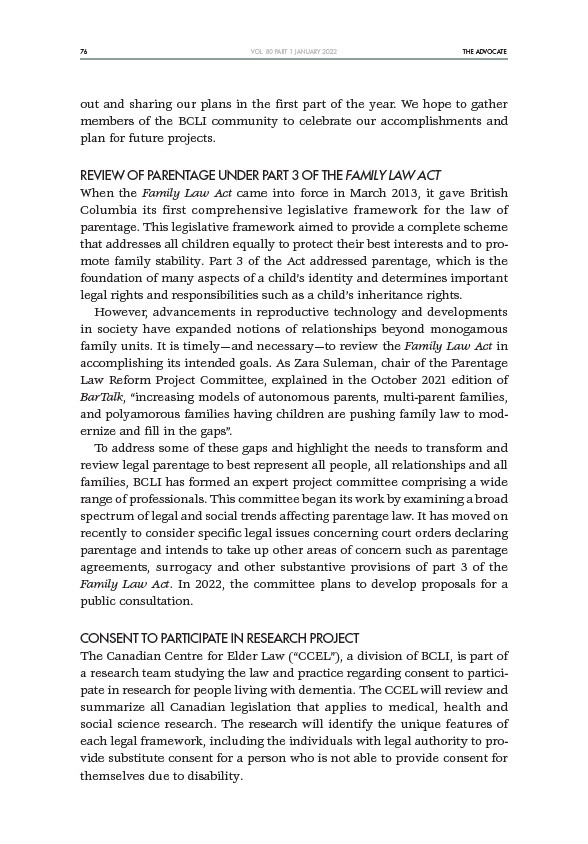
76 THE ADVOCATE
VOL. 80 PART 1 JANUARY 2022
out and sharing our plans in the first part of the year. We hope to gather
members of the BCLI community to celebrate our accomplishments and
plan for future projects.
REVIEW OF PARENTAGE UNDER PART 3 OF THE FAMILY LAW ACT
When the Family Law Act came into force in March 2013, it gave British
Columbia its first comprehensive legislative framework for the law of
parentage. This legislative framework aimed to provide a complete scheme
that addresses all children equally to protect their best interests and to promote
family stability. Part 3 of the Act addressed parentage, which is the
foundation of many aspects of a child’s identity and determines important
legal rights and responsibilities such as a child’s inheritance rights.
However, advancements in reproductive technology and developments
in society have expanded notions of relationships beyond monogamous
family units. It is timely—and necessary—to review the Family Law Act in
accomplishing its intended goals. As Zara Suleman, chair of the Parentage
Law Reform Project Committee, explained in the October 2021 edition of
BarTalk, “increasing models of autonomous parents, multi-parent families,
and polyamorous families having children are pushing family law to modernize
and fill in the gaps”.
To address some of these gaps and highlight the needs to transform and
review legal parentage to best represent all people, all relationships and all
families, BCLI has formed an expert project committee comprising a wide
range of professionals. This committee began its work by examining a broad
spectrum of legal and social trends affecting parentage law. It has moved on
recently to consider specific legal issues concerning court orders declaring
parentage and intends to take up other areas of concern such as parentage
agreements, surrogacy and other substantive provisions of part 3 of the
Family Law Act. In 2022, the committee plans to develop proposals for a
public consultation.
CONSENT TO PARTICIPATE IN RESEARCH PROJECT
The Canadian Centre for Elder Law (“CCEL”), a division of BCLI, is part of
a research team studying the law and practice regarding consent to participate
in research for people living with dementia. The CCEL will review and
summarize all Canadian legislation that applies to medical, health and
social science research. The research will identify the unique features of
each legal framework, including the individuals with legal authority to provide
substitute consent for a person who is not able to provide consent for
themselves due to disability.